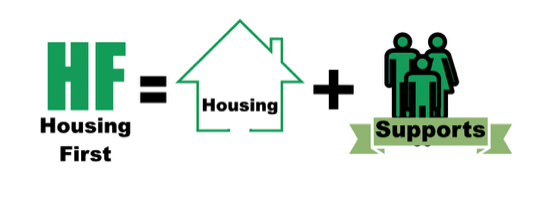

Housing First Umpqua
Housing First
Housing First is not "a program."
It is a whole-system approach to solve homelessness.
As a philosophy Housing First is based on the simple premise that housing is a human right, and everyone should be housed. It does not matter why a person is homeless, each of us has the inalienable right to have shelter.
Housing First is a change in homeless assistance. It is very different from the Housing Ready approach that has been used for decades. Housing Ready is the current way homeless services are provided in Douglas County, and the main challenge with it is sobriety is a requirement to get housed. It has proven to be a failure when trying to house those with the most barriers. Housing First has demonstrated promise as a better way to solve homelessness than the traditional Housing Ready approach.
Housing First is a very different way of thinking about how to solve homelessness, particularly for those who are chronically homeless and living outside. These folks often have mental health and substance abuse issues. They have been the hardest to get housed and to keep housed. Housing First has proven effective in helping those with the most housing challenges.
Having housing helps stabilize people so they are more likely to benefit from services that can permanently end their homelessness. Being housed improves the quality of their lives, while making our communities better.
Housing First was initially made part of our federal Housing & Urban Development (HUD) homeless services during the administration of President George W. Bush. It is part of the Continuum of Care (CoC) grants that our community gets to address homelessness.
According to HUD:
Data shows Housing First works!
The state of Oregon also supports Housing First. It's new General Assistance (GA) program is based on the Housing First approach. Oregon recognizes the importance of housing and provides resources for our most vulnerable citizens by providing GA to people who are severely disabled and homeless while their Social Security SSI case is pending.
Although Housing First did not become part of the federal government landscape until the early 2000s, the model has been around since around 1990. It was developed as a better way to keep those with mental illness housed.** Many of these folks also had substance abuse issues. Housing First has proven its effectiveness in housing the most challenging people to keep housed.
Housing First is about housing, and so much more. It is about providing permanent affordable housing based on the needs of those who are homeless or at risk of being homeless. This can work for those who are the easiest to house, also.
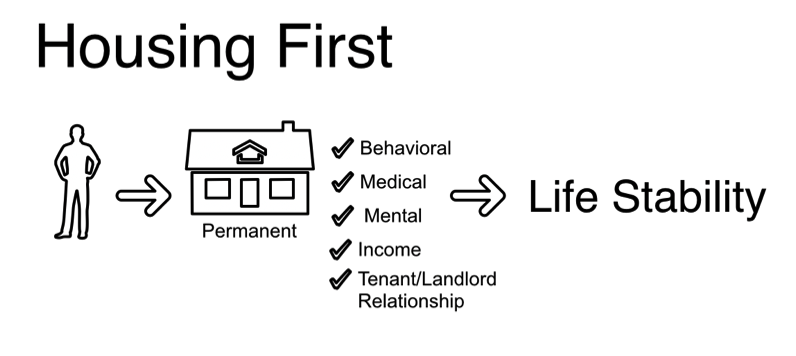
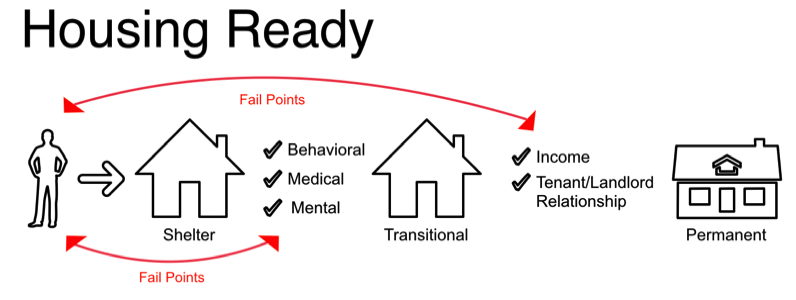
According to The National Alliance to End Homelessness:
“Housing First is an approach to quickly and successfully connect individuals and families experiencing homelessness to permanent housing without preconditions and barriers to entry, such as sobriety, treatment or service participation requirements. Supportive services are offered to maximize housing stability and prevent returns to homelessness as opposed to addressing predetermined treatment goals prior to permanent housing entry.”
"[Housing First] is guided by the belief that people need basic necessities like food and a place to live before attending to anything less critical, such as getting a job, budgeting properly, or attending to substance use issues. Additionally, Housing First is based on the theory that client choice is valuable in housing selection and supportive service participation, and that exercising that choice is likely to make a client more successful in remaining housed and improving their life.” *
instead of
With Housing First we all win!
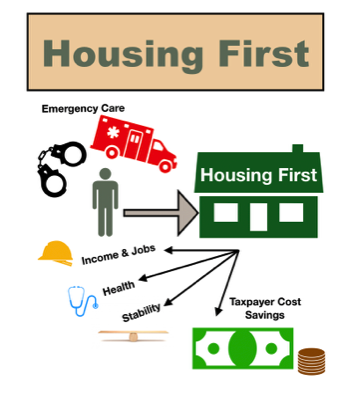
All external links, images and videos are for educational and resource purposes only and are used under the "fair use" clause of the Copyright Act. All rights reserved to the original creator of the work.
Video: Housing Ready No! Housing First Yes! Source: Homeless and Hungry (FaceBook)
There is a growing body of evidence that Housing First reduces homelessness among all categories of people. This includes those who have recently become homeless or those who suffer from chronic homelessness, including families with children, seniors and people with serious disabilities. Housing First helps families who just need decent, safe, affordable housing, and others who need extensive long-term support services to stay permanently housed. The key to the success of Housing First is to have all the components necessary to make it work.
U.S. Interagency Council on Homelessness (USICH) observes:
Based on current evidence, a comprehensive Housing First effort is the only way to reduce homelessness in Douglas County.
“To improve housing outcomes, communities are making a fundamental shift to Housing First, removing as many obstacles and unnecessary requirements as possible that stand in the way of people’s access to permanent housing. They are also developing coordinated systems with multiple entry points and standardized approaches to assessment in order to streamline people’s ability to access needed housing resources and programs—including mainstream programs like workforce services, early childhood education, schools, health and behavioral health care programs, affordable housing, and others."
The data shows that $17,858 per person was saved in Denver in a two year period. Denver has not ended homelessness but has reduced the cost of addressing homelessness, with better outcomes using the Housing First approach.
L.A. found it cost only $605/month per person to provide supportive housing, while they spent over four times as much in jail and medical intervention without it.
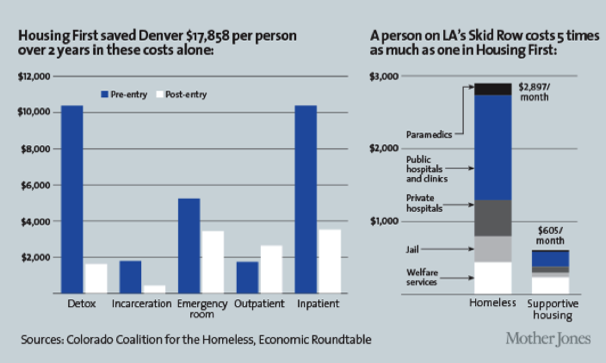
Here are some examples of how Housing First is successfully saving money and having better outcomes in reducing homelessness in other places.
Video: Utah Provides Housing For Homeless Source: NBC News (YouTube)